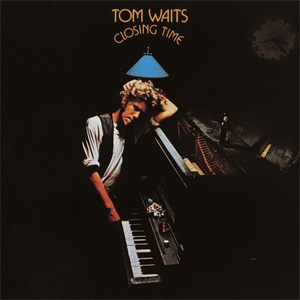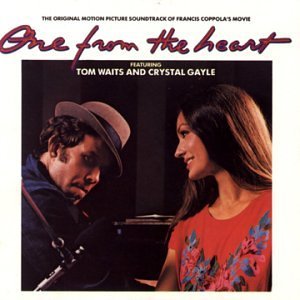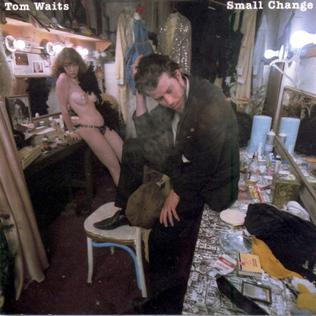Related Research Articles

Thomas Alan Waits is an American musician, composer, songwriter, and actor. His lyrics often focus on the underbelly of society and are delivered in his trademark deep, gravelly voice. He began in the folk scene during the 1970s, but his music since the 1980s has reflected the influence of such diverse genres as rock, country, Delta blues, opera, vaudeville, cabaret, funk, hip hop and experimental techniques verging on industrial music. Per The Wall Street Journal, Waits “has composed a body of work that’s at least comparable to any songwriter’s in pop today. A keen, sensitive and sympathetic chronicler of the adrift and downtrodden, Mr. Waits creates three-dimensional characters who, even in their confusion and despair, are capable of insight and startling points of view. Their stories are accompanied by music that’s unlike any other in pop history.”

Closing Time is the debut album by American singer-songwriter Tom Waits, released on March 6, 1973, on Asylum Records. Produced and arranged by former Lovin' Spoonful member Jerry Yester, Closing Time was the first of seven of Waits' major releases by Asylum.

One from the Heart is a soundtrack album of Tom Waits compositions for the Francis Ford Coppola film of the same name. It was recorded from October 1980 to September 1981. It was during this period that Waits met his wife Kathleen Brennan, an employee at the studio where it was recorded. While the film was released in February, the soundtrack album release was delayed until October of 1982 due to a dispute between Columbia Records and Coppola's Zoetrope Studios.

Small Change is the fourth studio album by singer and songwriter Tom Waits, released on September 21, 1976 on Asylum Records. It was recorded in July at Wally Heider's Studio 3 in Hollywood. It was successful commercially and outsold his previous albums. This resulted in Waits putting together a touring band - The Nocturnal Emissions, which consisted of Frank Vicari on tenor saxophone, FitzGerald Jenkins on bass guitar and Chip White on drums and vibraphone. The Nocturnal Emissions toured Europe and the United States extensively from October 1976 till May 1977.

Nighthawks at the Diner is the third studio album by singer and songwriter Tom Waits, released on October 21, 1975 on Asylum Records. It was recorded over four sessions in July in the Los Angeles Record Plant studio in front of a small invited audience set up to recreate the atmosphere of a jazz club. The album peaked at 164 on the Billboard 200, the highest place Waits had held at the time, and is currently certified silver by the BPI. It has received critical acclaim for its successful mood-setting, capturing of the jazz-club atmosphere and characterization.

Charles Douglas Musselwhite is an American blues harmonica player and bandleader, one who came to prominence, along with Mike Bloomfield, Paul Butterfield, and Elvin Bishop, as a pivotal figure in helping to revive the Chicago Blues movement of the 1960s. He has often been identified as a "white bluesman".
"Getting in Tune" is a song written by Pete Townshend and originally released by the Who on their 1971 album Who's Next. It was originally written as part of Townshend's abandoned Lifehouse project. Its lyrics describe the power of music, as well as reflect the inner contradictions Townshend was feeling at the time between his spiritual needs and his persona as a rock star. The music incorporates a number of changes in tempo and has been praised by critics for its use of dynamics.

"Just Like Tom Thumb's Blues" is a song written and performed by Bob Dylan. It was originally recorded on August 2, 1965, and released on the album Highway 61 Revisited. The song was later released on the compilation album Bob Dylan's Greatest Hits Vol. II and as two separate live versions recorded at concerts in 1966: the first of which appeared on the B-side of Dylan's "I Want You" single, with the second being released on The Bootleg Series Vol. 4: Bob Dylan Live 1966, The "Royal Albert Hall" Concert. The song has been covered by many artists, including Gordon Lightfoot, Cat Power, Nina Simone, Barry McGuire, Judy Collins, Frankie Miller, Linda Ronstadt, the Grateful Dead, Neil Young, The Black Crowes, Townes Van Zandt, and Bryan Ferry. Lightfoot's version was recorded only weeks after Dylan's original had been released and reached #3 on the Canadian RPM singles chart.

"Waiting on a Friend" is a song by the English rock band the Rolling Stones from their 1981 album Tattoo You. Written by Mick Jagger and Keith Richards and released as the album's second single, it reached No. 13 on the Billboard Hot 100 singles chart in the US.
"Jersey Girl" is a song composed and originally sung by American singer-songwriter Tom Waits from his 1980 album Heartattack and Vine.

"The Seeker" is a song written by Pete Townshend and performed by English rock band the Who. First released as a non-album single in March 1970, it is included on their 1971 compilation album Meaty Beaty Big and Bouncy and other compilations.
"Time Waits for No One" is a song by the English rock band the Rolling Stones from the 1974 album It's Only Rock 'n Roll. It was the first song recorded for the album.

Bounced Checks is the first compilation of Tom Waits recordings, including album, live and alternate versions of songs from six of his seven albums for Asylum Records, excepting his debut, Closing Time.

"Pretty Persuasion" is a song by R.E.M. that was first released on the band's 1984 album Reckoning. It was released as a promotional single and reached number 44 on Billboard's Rock Tracks chart. According to R.E.M. biographer Tony Fletcher, it is often regarded as "the 'archetypal' R.E.M. anthem".
"Tom Traubert's Blues (Four Sheets to the Wind in Copenhagen)" (commonly known as "Tom Traubert's Blues" or "Waltzing Matilda") is a song by American musician Tom Waits.
"Romeo Is Bleeding" is a song written and performed by Tom Waits, and released on his 1978 album Blue Valentine. The lyrics make frequent use of Spanish, including phrases such as "Hey Pachuco!", "Dáme esa pistola, hombre!", "Hijo de la chingada madre!", and "Vamos a dormir, hombre". Waits also makes a reference to gangster movie-star James Cagney, previously mentioned in "Invitation to the Blues" on Small Change.

"Dance Little Sister" is a song written by Mick Jagger and Keith Richards that was first released on the Rolling Stones 1974 album It's Only Rock 'n Roll. It was also released as the B-side of the Rolling Stones single "Ain't Too Proud to Beg" and on several of their compilation albums.

"Bartender's Blues" is a song written by James Taylor and first released on his 1977 album JT. It was also released as the B-side of the lead single from JT, "Handy Man". It has since been covered by George Jones and other artists.

"You Can Close Your Eyes" is a song written by James Taylor which was released on his 1971 album Mud Slide Slim and the Blue Horizon. It was also released as the B-side to his #1 single "You've Got a Friend". It has often been described as a lullaby. It was initially recorded by his sister Kate Taylor for her 1971 album Sister Kate. The song has been covered by many artists, including Carly Simon, Linda Ronstadt, Maureen McGovern, Richie Havens, Sheryl Crow, Sting, Eddie Vedder with Natalie Maines, and the King's Singers.

"Whispering Pines" is a song written by Richard Manuel and Robbie Robertson that was first released by The Band on their self-titled 1969 album The Band. It was released as a single in France, backed by "Lonesome Suzie".
References
- ↑ Kessel, Corinne (2007) The words and music of Tom Waits, Praeger, p23
- 1 2 Humphries, Patrick (2007) The many lives of Tom Waits, Omnibus Press, pp. 92–93.
- 1 2 3 4 "The Piano Has Been Drinking" lyrics - Tom Waits Library - accessed February 19, 2021
- ↑ IMDb - Season_01, episode_21 - aired 1977-August-01st
- ↑ youTube - Tom Waits - the Piano Has Been Drinking - 1977
- ↑ "The Piano Has Been Drinking (Not Me)" review - Allmusic review by Bill Janovitz - accessed November 14, 2010